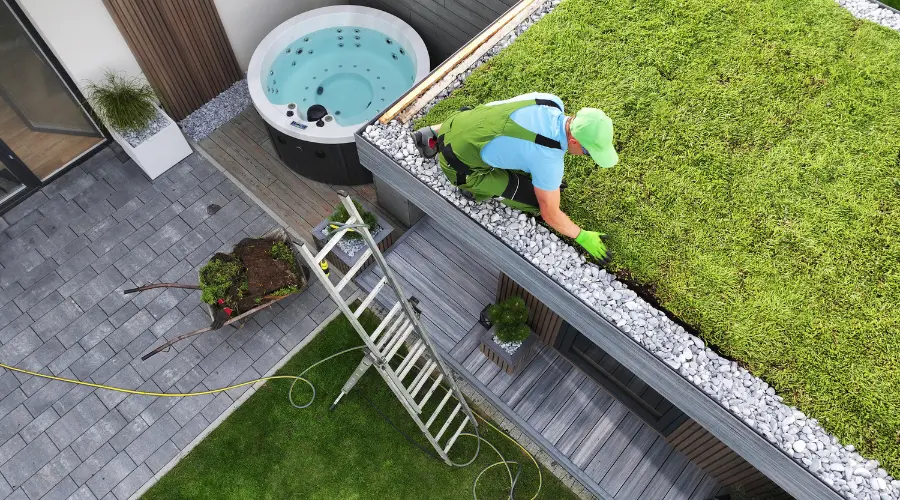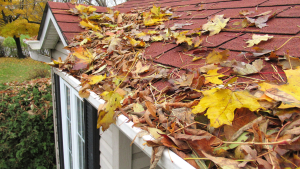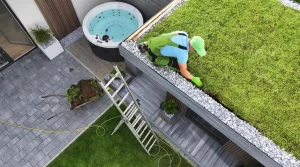Landscaping is more than aesthetic—it’s a transformative practice with environmental, economic, and emotional advantages. From raising the value of real estate to improving air quality, thoughtful landscaping protects homes and enriches lives.
Key Takeaways
- Landscaping enhances property value by up to 20%, making it a valuable investment.
- It improves air quality, reduces energy costs, and supports mental health.
- Proper landscaping promotes biodiversity, prevents soil erosion, and creates inviting outdoor spaces.
- Poorly managed landscaping can lead to gutter debris, affecting home maintenance.
- Sustainable landscaping practices benefit your home, community, and the planet.
What Is the Impact of Landscaping?
Landscaping is a cornerstone of property enhancement and environmental stewardship. Here’s how it makes a difference:
- Curb Appeal & Market Value: A beautifully designed landscape makes properties more attractive and increases market value by up to 20%. Potential buyers are drawn to lush lawns, vibrant flower beds, and mature trees, which convey care and quality.
- Environmental Benefits: Landscaping reduces carbon footprints by fostering plant life that purifies the air and absorbs carbon dioxide. It also stabilizes soil, minimizes erosion, and creates habitats for wildlife, supporting local ecosystems.
- Enhanced Living Spaces: Thoughtful landscaping transforms outdoor areas into spaces for relaxation, recreation, and social gatherings, enriching the homeowner’s quality of life.
Landscaping and Gutter Debris: What You Need to Know
Landscaping can inadvertently contribute to home maintenance issues, particularly with gutter debris. Overhanging branches, falling leaves, and twigs often clog gutters, leading to:
- Water Damage: Overflowing water might result from blocked gutters damaging walls, roofs, and foundations.
- Energy Inefficiency: Clogged gutters can hinder proper drainage, affecting insulation and energy use.
Solution: Regular gutter cleaning and strategic tree trimming are essential. Partnering with professionals like Bergen County Power Washing and Gutter Cleaning ensures your gutters stay clear and your home remains protected.
6 Reasons Why Landscaping Is Important
1. Enhances Property Value
A well-maintained landscape can boost property value significantly. Features like manicured lawns, well-placed trees, and creative designs create positive first impressions. Homebuyers often equate attractive landscaping with better property upkeep.
2. Improves Air Quality
Plants act as natural air filters. They absorb pollutants, release oxygen, and reduce airborne dust and allergens. Urban areas benefit greatly as greenery offsets the heat island effect, creating cooler, cleaner environments.
3. Reduces Energy Costs
Strategically placed trees and shrubs provide shade during summer and windbreaks in winter. As a result, there is less need for heating and cooling equipment. Cutting energy costs by up to 25%.
4. Supports Mental Health
Stress and anxiety are decreased by being in green areas. Whether through gardening, walking, or simply enjoying the view, landscaped areas promote relaxation and encourage healthy outdoor activities.
5. Promotes Biodiversity
Landscaping fosters ecosystems that support birds, pollinators, and other wildlife. Including native plants enhances the resilience of these ecosystems, contributing to ecological balance while creating a dynamic outdoor space.
6. Prevents Soil Erosion
Plant roots anchor the soil, preventing erosion and water runoff. Ground covers, shrubs, and trees maintain soil integrity, especially in regions with high rainfall or steep hills.
FAQs About Landscaping
How does landscaping increase property value?
Landscaping improves a property’s visual appeal, making it more attractive to buyers. Features like mature trees and colorful flower beds add a polished, welcoming touch, often resulting in faster sales at higher prices.
Can landscaping reduce my energy bills?
Yes, strategically planted trees and shrubs provide:
- Natural insulation.
- Shading your home in summer and acting as windbreaks in winter.
- Lowering the requirement for artificial cooling and heating.
How can landscaping benefit mental health?
Landscaping offers a connection to nature, which reduces stress, anxiety, and depression. It also promotes physical activity, such as gardening and walking, which enhances mood and well-being.
What plants are best for promoting biodiversity?
Native plants are ideal as they attract local pollinators like bees and butterflies. Mixing flowering plants with shrubs and trees creates a diverse habitat for various species.
How often should I clean my gutters if I have trees nearby?
Gutters should be cleaned at least twice a year, perhaps more often if you have trees that hang over the ground. Regular maintenance prevents blockages and protects your home from water damage.
Can landscaping help with water conservation?
Yes, incorporating drought-resistant plants and efficient irrigation systems reduces water usage. Mulching and rain gardens further enhance water conservation efforts.
What are the best low-maintenance landscaping options?
Opt for native plants, ornamental grasses, and ground covers that require minimal watering and pruning. Hardscaping features like stone pathways or patios also reduce upkeep.
Conclusion
Landscaping is not just about beautifying your space; it’s a strategic investment in your property, well-being, and the planet. From enhancing curb appeal to fostering biodiversity and reducing energy costs, the benefits are vast. However, maintaining your landscape—like clearing gutter debris—is crucial to prevent costly issues.With proper care and professional support, your landscape can be a haven of beauty, functionality, and sustainability. Embrace the transformative power of landscaping and create a space that reflects your commitment to a better home and environment. Keep your home looking its best! Contact Bergen County Gutter Cleaning & Power Washing today for spotless windows, debris-free gutters, and a cleaner exterior you can be proud of










